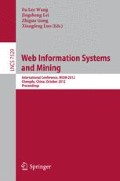Abstract
Although the FP-Growth association-rule mining algorithm is more efficient than the Apriori algorithm, it has two disadvantages. The first is that the FP-tree can become too large to be created in memory; the second is the serial processing approach used. In this paper, a kind of parallel association-rule mining algorithm has been proposed. It does not need to create an overall FP-tree, and it can distribute data mining tasks over several computing nodes to achieve parallel processing. This approach will greatly improve efficiency and processing ability when used for mining association rules and is suitable for association-rule mining on massive data sets.
Access this chapter
Tax calculation will be finalised at checkout
Purchases are for personal use only
Preview
Unable to display preview. Download preview PDF.
References
Agrawal, R., Imielinski, T., Swami, A.: Mining association rules between sets of items in large databases. In: Proceedings, ACM SIGMOD International Conference on Management of Data, Washington, DC, pp. 207–216 (1993)
Agrawal, R., Srikant, R.: Fast algorithms for mining association rules. In: Proceedings, 1994 International Conference on Very Large Data Bases (VLDB 1994), Santiago, Chile, pp. 487–499 (1994)
Han, J., Pei, J., Yin, Y.: Mining frequent patterns without candidate generation. In: Proceedings, ACM-SIGMOD International Conference on Management of Data, pp. 1–12. ACM Press, Dallas (2000)
Pramudiono, I., Kitsuregawa, M.: Parallel FP-Growth on PC cluster. In: Proceedings, International Conference on Internet Computing, Seoul Korea, pp. 467–473 (2003)
Zaïane, O.R., Mohammad, E.H., Lu, P.: Fast parallel association rule mining without candidacy generation. In: Proceedings, 1st IEEE International Conference on Data Mining, pp. 665–668. IEEE Computer Society Press, San Jose (2001)
Liu, L., Li, E., Zhang, Y., et al.: Optimization of frequent item-set mining on multiple-core processors. In: Proceedings, 33rd International Conference on Very Large Data Bases, pp. 1275–1285. VLDB Endowment, Vienna (2007)
Tan, K.-L., Sun, Z.-H.: An algorithm for mining FP-trees in parallel. Computer Engineering and Applications (13), 155–157 (2006) (in Chinese)
Chen, M., Li, H.-F.: FP-Growth parallel algorithm in cluster system. Computer Engineering (20), 71–75 (2009) (in Chinese)
Author information
Authors and Affiliations
Editor information
Editors and Affiliations
Rights and permissions
Copyright information
© 2012 Springer-Verlag Berlin Heidelberg
About this paper
Cite this paper
Wang, Zg., Wang, Cs. (2012). A Parallel Association-Rule Mining Algorithm. In: Wang, F.L., Lei, J., Gong, Z., Luo, X. (eds) Web Information Systems and Mining. WISM 2012. Lecture Notes in Computer Science, vol 7529. Springer, Berlin, Heidelberg. https://doi.org/10.1007/978-3-642-33469-6_18
Download citation
DOI: https://doi.org/10.1007/978-3-642-33469-6_18
Publisher Name: Springer, Berlin, Heidelberg
Print ISBN: 978-3-642-33468-9
Online ISBN: 978-3-642-33469-6
eBook Packages: Computer ScienceComputer Science (R0)

